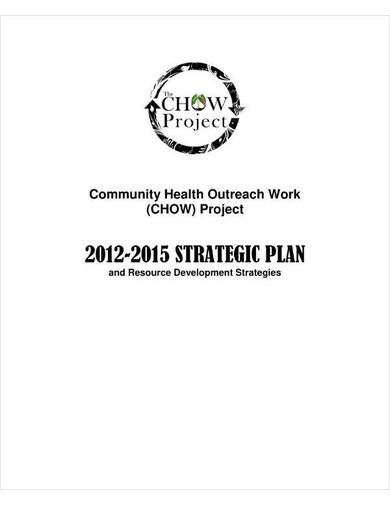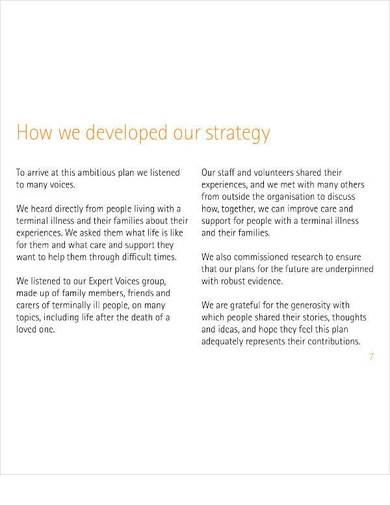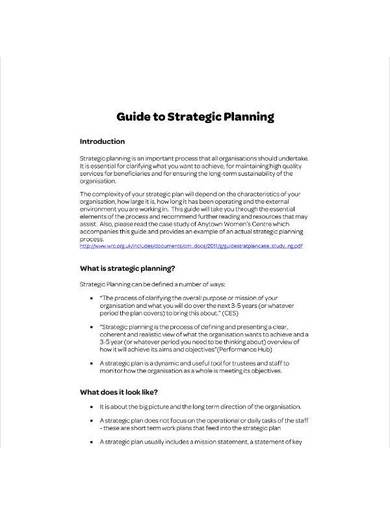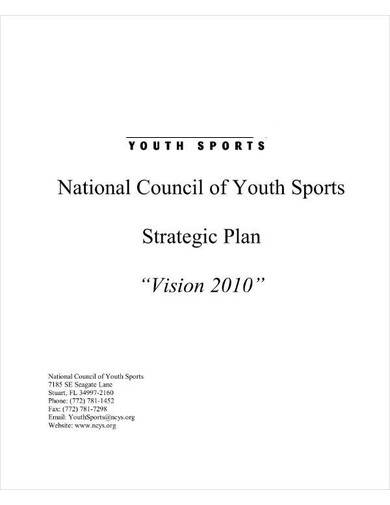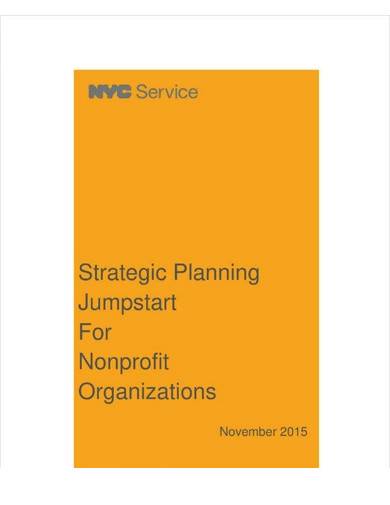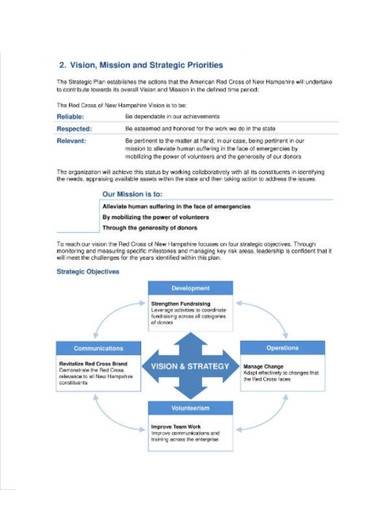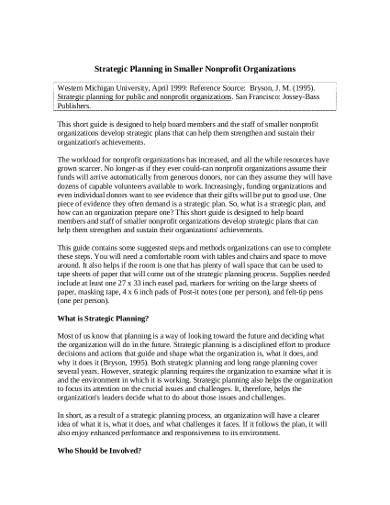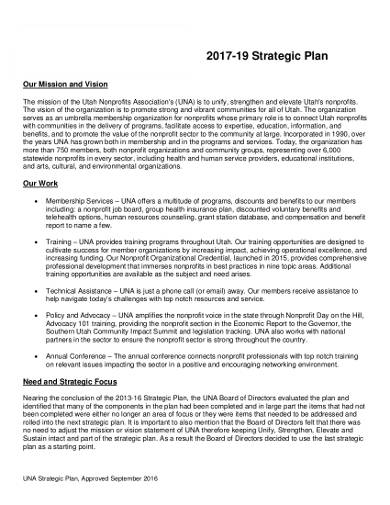Feeding America’s founder, John van Hengel, started as a soup kitchen volunteer. The nonprofit’s core idea of a “food bank” came from a mother in need who regularly searched for food at a grocery store’s garbage bin. Hengel responded to this need and ultimately established one of the country’s top charities, which earned $2.8 billion of private donations in 2019. Every nonprofit start with a vision to birth specific objectives. In order to help these objectives produce actions and plans, the nonprofit organization strategic plan caters to the process making the group’s aspirations a reality.
FREE 10+ Nonprofit Organization Strategic Plan Samples
1. Organizational Strategic Plan Template
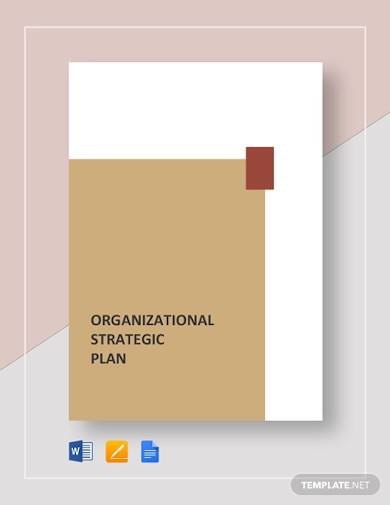
2. Sample Strategic Plan Template

3. Nonprofit Strategic Plan Template
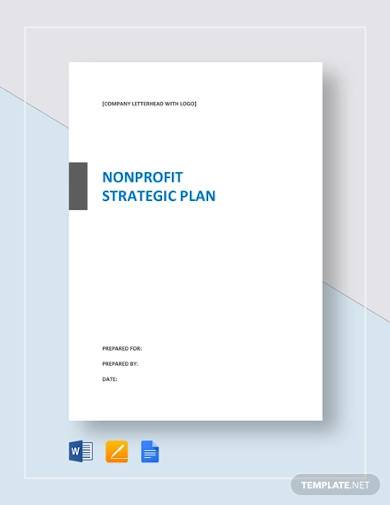
4. Non-profit Project Strategic Plan Template
5. Nonprofit Health Care Strategic Plan
6. Women’s Resource Center Strategic Planning
7. Nonprofit Sports Club Strategic Plan
8. Sample Nonprofit Organization Strategic Planning
9. Nonprofit Organization Strategic Plan
10. Small Nonprofit Organization Strategic Planning
11. Sample NGO Strategic Plan Template
What Is a Nonprofit Organization Strategic Plan?
In basic terms, a nonprofit organization’s strategic plan points to developing different measures or activities to accomplish the organization’s objectives by assessing their present circumstance and future goals. Strategic implementation planning takes them into a thorough process to evaluate their objectives and look into the details of their plans to help them pave a path that produces their desired results. When done right, it assures a great contribution toward a nonprofit’s growth.
How to Make Your Strategy Work
Inc delivers rather unpleasant news when it comes to strategic planning: 90 percent of them fail. Does this mean it’s not worth pursuing anymore? Definitely not. In most cases, when something doesn’t go the way you want it, it’s not always because it’s infeasible. In most cases, you just failed to acknowledge factors that might have hindered its success. Here are some ways on how to make your strategy produce positive results:
1. Create a plan because you need one. In most cases, organizations’ leaders only establish plans because it wouldn’t look good not to have them. The impartial commitment to follow through the process and the action’s feeble motivation can significantly impact the plan’s outcome. Set your focus to exhausting all possible efforts to reap what you want to achieve.
2. Communicate constantly. The plan’s success relies on what its roles are doing to continue with the tasks. Constant communication is an integral factor in receiving updates of everyone’s task and maintaining the group’s drive to implement its project plans.
3. Acknowledge the possibility of sudden shifts. Your strategic plan must take into account unexpected changes that can disrupt your established course of action. Finding alternative resources, accepting sudden reorganization, and adapting to plan alterations is crucial to making your plan work. You might need to follow a completely different route from what you’ve initially decided.
4. Avoid making the plan too complicated. Complications are part of every planning and something that any group should anticipate. However, complications can also come due to the strategy’s complexity. The harder the procedure is, the more complicated the plan can become, which can be hard and unproductive to follow through until the end. Remember to stick to the basics. If it demands an intricate process, break it down to manageable team action plans.
How to Make a Nonprofit Organization Strategic Plan
1. Identify Your Organization’s Mission
As a nonprofit organization, your mission and vision play a huge part in your strategic planning. It’s the core of your organization’s initiatives. It is where you’ll base your efforts to promote programs and advocacies to be of help to your community. Develop a mission statement that will tell those around you what’s your purpose. Whether you want to establish better education, defend minorities from abuse, help children in need, and support women in the community, this will give you an idea of implementing your strategies.
2. Have Actionable Objectives
Out of your mission statement, define goals that you want to achieve on a specific timeline. These are the results that you want to achieve your mission’s ideals. Remember to make them actionable. Instead of writing generic statements, be detailed about it. If you aim to extend educational support to different children, specify where, how many are your beneficiaries, and when’s your target date. It makes your objective realistic and easier to implement when you make plans to make it come true.
3. Establish Goal-Based Initiatives
It is where you’ll convert your objectives into a strategic action plan. It is where you’ll determine tasks, projects, fundraising plans, plan procedures, and other initiatives that would work towards accomplishing your goal. These are the things that your organization will perform. As an example, if you plan to help disease-stricken canines get better and find loving homes, your action steps should include which animal shelter you will approach, how you’ll find willing foster homes, how much you intend to raise for the funds, and where the resources will come from. The accomplishment of these initiatives will result in the fulfillment of your objectives.
4. Create Performance Measures
If you want to know if your plans are working, have the means to measure your organization’s growth and whether your actions are producing results according to your established objectives. Create an appropriate key performance indicator (KPI) sheet to help you map your success. Besides determining if your strategies are working in favor of your goals, it helps you assure your stakeholders that their support is used according to what’s intended.
FAQs
What are the elements of a strategic plan?
According to The Balance Careers, the strategic plan elements are vision statement, mission statement, core values, SWOT analysis, long-term goals, annual objectives, and action plan.
What are the different stages of strategic management?
The stages of strategic management are strategy formulation, strategy implementation, and strategy evaluation.
How long does it usually take to create a strategic plan?
While it depends on different industries and organizations, it usually takes three to for months.
A nonprofit’s philanthropic aim to mobilize change and publicizing some of the most crucial socioeconomic issues makes the organization a significant part of every society. It also deserves all the support it can get to lobby their cause. A strategic plan plays an important role in meeting its goals by accomplishing their plans and initiatives.
Related Posts
FREE 14+ Event Marketing Plan Templates in PDF MS Word
FREE 6+ Charity Event Planning Samples & Templates in PDF
FREE 6+ Consultant Budget Samples in PDF MS Word
FREE 20+ Sample Operational Plan Templates in PDF MS Word
FREE 21+ Sample Business Plan Outlines in MS Word PDF
FREE 21+ Business Plan Samples in Ms MS Word PDF | Google ...
FREE 13+ Sample Church Organizational Chart templates in PDF ...
FREE Marketing Strategy and Marketing Plan [ Difference, 9+ ...
FREE 11+ Strategic Marketing Plan Templates in PDF MS Word
FREE 9+ Sample Succession Plan Templates in PDF MS Word
FREE 5+ Sample social worker cover letters in PDF MS Word
FREE 10+ Sample Investment Policy Statement Templates in MS ...
FREE 10+ Charity Data Retention Policy Samples & Templates in ...
FREE 9+ Sample Business Implementation Plan Templates in PDF ...
Sample Compliance Manual Template

